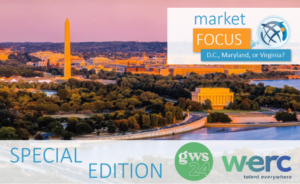
Choosing where to live in the Washington, D.C. metro area can feel like picking the right play—there are lots of options, and each comes with its own game plan. This region is often referred to as the “DMV,” which stands for D.C., Maryland, and Virginia, three key players on the same team, each bringing their own strengths to the field. Whether you’re moving for work, lifestyle changes, or to be closer to family, here’s a breakdown to help you score the best fit based on lifestyle, commute, and budget.
Washington, D.C.: A Vibrant City Hub
If you love being at the center of the action, D.C. might just be your winning play.
Lifestyle: With a lively downtown, cultural landmarks, and events happening year-round, D.C. offers an unbeatable urban experience. From Dupont Circle to Capitol Hill, you’ll always find something to explore.
Commute: D.C.’s Metro system offers convenient and reliable transportation, making it easy to get around the city— you might not even need a car.
Schools: D.C. offers a mix of public and private schools, though public schools have a mixed reputation; many residents opt for charter or private schools. D.C. is also home to the Washington International School and The British School.
Cost: Be prepared for higher rent, especially in popular areas.
Best for: Those who enjoy fast-paced, city living with plenty of entertainment and cultural experiences.
Maryland: The Suburban Sweet Spot
Maryland features charming older homes and well-established neighborhoods, offering a community-oriented lifestyle with easy access to parks and the big city.
Lifestyle: Suburbs like Bethesda and Silver Spring provide a quieter feel compared to D.C., with a strong sense of community and outdoor amenities.
Commute: Some areas are Metro-accessible, making trips into D.C. manageable without taking too much time off the clock.
Schools: Maryland is known for highly rated public schools, especially in Montgomery County, with access to top-ranking education programs. The Maryland suburbs have two popular international independent schools- The German School and The French School.
Cost: While rent is generally more affordable than in D.C., upscale areas such as Bethesda still come with higher price tags.
Best for: Families or individuals seeking a suburban lifestyle with easy access to D.C. amenities.
Virginia: The Hub of Variety and Convenience
Virginia’s urban sprawl presents a diverse range of lifestyles, from bustling urban centers to serene suburbs, all with convenient access to work, leisure activities, and outdoor adventures.
Lifestyle: Arlington and Alexandria offer an urban vibe, while places like Fairfax and Falls Church provide a more relaxed, suburban environment.
Commute: Close-in areas like Arlington have excellent Metro access, but the further you go, public transportation becomes limited.
Schools: Virginia’s Fairfax and Arlington counties are home to some of the best public schools in the country, known for strong academic programs.
Cost: Generally, rent is lower than in D.C., but it varies depending on the neighborhood.
Best for: Those seeking more affordable housing and a mix of suburban and city amenities with a manageable commute to D.C.
So, What’s Your Game Plan?
Ultimately, it all comes down to what matters most to you. Whether you’re drawn to the energy of D.C., the suburban comfort of Maryland, or the variety and convenience of Virginia, the D.C. metro area offers options for every lifestyle. Wherever you decide to land, you’ll be set up to enjoy the best the DMV has to offer—because here, every option leads to a win.
